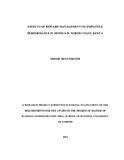| dc.description.abstract | Basing on the arguments of expectancy theory that employees expect a certain reward for
their input in the organization and the influence this has on employee performance as
depicted by the instrumentality theory, employee performance heavily rely on the kind of
reward management practices used by their organizations. The reward management
practices thus have a direct relationship with employee performance, (Ahmad et al,
2010). This is more desirable in the hotel industry in Kenya especially at a time when
insecurity is affecting tourism and the industry calling for the industry to really market
itself and gain strategic edge over the other tourist destinations. The industry is highly
standardized thus the only left competitive tool in the quality of service offered by
employees which is determined by employee performance. It is on this background that a
study on effect of reward management on employee performance in the hotel industry in
Kenya was carried out with an aim of optimizing employee performance in the industry
as a means of gaining competitive edge over other destinations. The objective of the
study was thus to determine the effect of reward management on employee performance
in the hotel industry in Kenya. Therefore, the study used a descriptive cross sectional
survey design which would give the quantitative relationship between the reward
management practices employed and employee performance at a particular point in time
to be used for generalization to other times. The study targeted the beach Hotels in North
coast Kenya given that the industry is saturated in the area. Given that the study was a
survey, there was no need of sampling and the study thus used all the 27 beach resorts in
North Coast, Kenya. The study used primary data which was collected using structured
questionnaires administered using the drop and pick method. The collected data was then
sorted for validity and reliability and coded then quantitatively analyzed using mean and
standard deviation. This was done independently for each of the variables. This was
followed by a correlation analysis. The study found high correlation between reward
management and employee performance. The study however found that as much as there
was a reward policy in place, it was fairly weak as the reward strategies that have very
high correlation with employee performance such as grade structure, performance
appraisal and strategic reward were weakly implemented but concentration was on
contingent pay and equal pay which have a relatively weaker correlation with
performance. A recommendation was thus made for the hotels to change their reward
policies in order to align the reward management practices based on their respective
correlation to employee performance. The researcher also recommended for a study to
establish the combination of various strategies that would optimize employee
performance with emphasis of the proportion to which each strategy is to be used as well
as a study to explore the modalities of applying job/grade structure in the hotel industry. | en_US |

